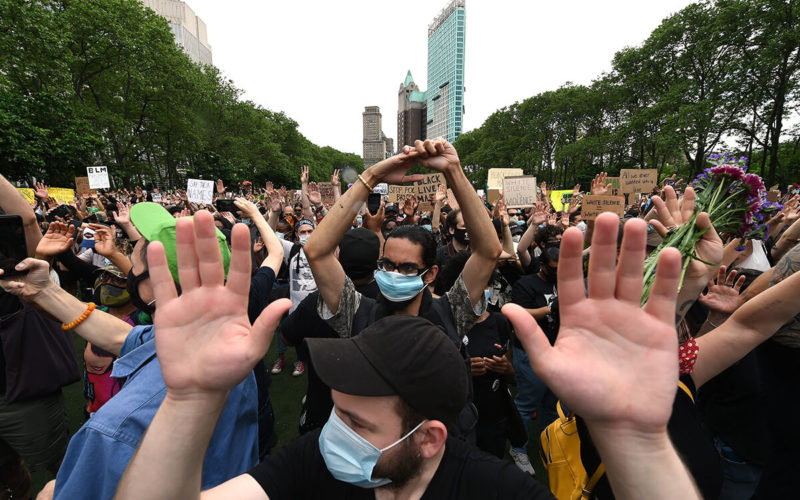As Black Americans’ righteous resistance to racism and police brutality fills social media and the streets, many white Americans are in a period of reevaluation. We may find ourselves wondering what our role is in perpetuating systemic, anti-Black racism, and how we can take action that is actively anti-racist.
This self-introspection is a fundamental starting point in the fight to build a more just society. It’s also an intense and deeply humbling process, at a time when a global pandemic has everyone stretched thin. It’s totally understandable to feel many conflicting emotions right now, including sadness, concern, confusion, guilt, or even a desire for things to return “back to normal.” At the same time, it’s important to remember that — as the brutal toll of the coronavirus pandemic on communities of color, and the police killing of George Floyd, Breonna Taylor, and countless others have especially highlighted — “normal” has never been safe for Black Americans.
The current moment, then, presents white Americans with the opportunity, and the obligation, to help create a new “normal” in which we no longer participate in, and benefit from, the oppression of Black people. It requires us to engage in a process of self-examination, education, and unlearning. Here are some ideas for white people engaging in this process.
Process Your Feelings Responsibly
It is totally reasonable to feel many, intense emotions right now. Rather than shrinking away from these feelings, you can begin by sitting with and examining them. What’s coming up for you in the current moment? What was your previous understanding of race and racism, and in what ways have these preconceptions been challenged? Consider taking an implicit bias test to get a better insight into your own internalization of white supremacy and anti-Black racism.
You may be surprised or disturbed by your results. You may also feel disturbed by and ashamed of any racist beliefs or attitudes you find surfacing in this process of introspection. Rather than deny that these feelings exist, you can choose instead to sit with them, to examine them, and to educate yourself so you can learn anti-racist ways of thinking and being. It might help to journal about these feelings. It may also help to talk about these feelings with other white friends engaging in a similar process, or with a mental health professional who demonstrates a commitment to anti-racism in their practice.
It’s important to process whatever you are feeling responsibly, in a way that does not burden people of color or add to the harm and trauma they are experiencing. Take care not to use people of color as emotional sounding boards for your attitudes about race and racism. Unless you already have a close and trusting relationship with a specific loved one of color, and they have clearly indicated they are available for this kind of conversation with you, they’re not necessarily the person to have this conversation with right now.
Learn About Racism and White Supremacy
Educating ourselves about race, anti-Black racism, and white supremacy is also key to this process of unlearning. It’s important here to remember that educating ourselves about white supremacy — and particularly its role in the history of American capitalism — isn’t a favor we do for anyone. It is, instead, the bare minimum white Americans owe to people whose historical and contemporary exploitation has materially benefitted us.
Unlearning white supremacy is also something we do for ourselves, though not in the sense of aggrandizing ourselves or gaining “points” for being “woke” or “allies.” We do it, instead, with the understanding that the privileges conferred on white people by a racist system are ill-begotten, and that benefiting from others’ oppression is neither a morally acceptable nor spiritually healthy way to live.
There are numerous resources, reading lists, syllabi, discussion guides, and articles on anti-racism that you can begin to work through. Educator and advocate Rachel Ricketts’ anti-racism resources, which include a specific section for white people, are a good place to start. You can also begin with this collection of Writing Prompts About White Privilege, which are specifically designed to help you understand where you’re at, as well as this Antiracist Checklist for Whites.
American racism is systemic and historical, with roots in the colonization of indigenous land and the enslavement of African people. Its branches span the U.S. political system, economy, and military. But we’re often not taught much about the histories of people of color, or the histories of racist U.S. policy, in school. So these lists of longer reads are also a great way to continue digging into these histories in a comprehensive way.
Support Loved Ones of Color in a Thoughtful Way
With so much violence against Black Americans constantly on the news, it’s a natural and lovely impulse to want to support the people of color in your life. Remember, however, that it’s not just our intentions to provide support that matter; it’s also how we enact support. If you’ve ever been the recipient of a half-baked apology or a self-serving gesture, you know that insincere acts of kindness can be worse than not reaching out at all.
That means, before impulsively reaching out, taking stock of the relationships you have with the people of color in your life. By and large, white Americans occupy vastly segregated neighborhoods, workplaces, and friend groups, with the average white American having only one Black friend out of every hundred. Partly because of this, after widely reported incidents of racist violence, it’s not uncommon for people of color to receive unsolicited messages offering awkard condolences, uncomfortable confessions of past racism, racist apologia, or requests for anti-racist education from white people in their social networks. Often, these messages aren’t from close friends or loved ones with whom they have a history of intimate conversation about race, but from white acquaintances or strangers looking to offload feelings of guilt.
Before reaching out to people of color in your life to demonstrate concern or solidarity, ask yourself: is this person a genuine friend, or just an acquaintance? Am I reaching out with a real desire to be supportive toward them, or to clear my own conscience, assuage my own guilt, or gain reassurance that I’m “not racist?” Am I reaching out because they’re the only person of color I know, or because we are valued and active parts of each other’s lives? Have they clearly indicated that they are open to talking about race with me? If I reach out and I don’t like that person’s response, will I feel the need to defend myself?
If your answers to any of these questions give you pause, it’s probably better to work on yourself for now.
Take Collective Action
In order to create social change, it’s necessary for us to introspect. But that’s just a starting point. Change, ultimately, happens through collective action.
That action can take many forms. Protests are one of the most obvious and important means of enacting change. If you can hit the streets, social media is the best way to locate protests in your area. Be sure to research the protest organizers to make sure they are led by groups of color, and go with a buddy. Know your rights, wear a mask, and think through how you will keep yourself and your crew safe. People of color are at the greatest risk of police brutality, but as news reports indicate, protestors and journalists of all races have sustained serious injuries in the past week of intensified action.
Protesting in the streets right now isn’t everyone’s jam for many reasons, including mobility limitations, susceptibility to COVID-19, or simply a lack of comfort in or ability to be in large crowds. That’s totally okay. There are many ways to take collective action that don’t involve taking to the streets, including amplifying the movement on social media, providing food and PPE for protestors and medics, signing petitions, and more. You can find many suggestions for ways to get involved in collective action here, here, and here.
Another great way to take action is, of course, to move money toward people and organizations doing good work. You can donate to some of the many grassroots funds that have been doing this work for a long time, and follow them on social media. You can also consider donating to some of the many organizations that are providing free or reduced-cost mental health care for people of color, like the Borris Lawrence Henson Foundation, the Sista Afya General Fund, the Loveland Therapy Fund for Black women and girls, and the Black Journalists Therapy Relief Fund.
Take Care of Yourself
Finally, as always, remember to take care of yourself. The coronavirus pandemic has been difficult for all of us, and times of massive social upheaval are stressful even if they lead to positive change. Realizing that a movement isn’t primarily about you doesn’t mean that you stop grounding, caring for, and loving yourself.
In fact, caring for ourselves — keeping ourselves healthy, resting, processing our trauma, connecting with our loved ones, and working through our issues — is foundational to social transformation. When people with more privilege don’t keep our own emotional houses tidy, we outsource that grief, pain, and guilt onto those already more burdened than us. That’s unfair.
On the other hand, when we plug into our own power source and commit to doing hard, but ultimately valuable, work, we reduce that care burden. Ultimately, we help enable the conditions for a truly just and equal society.
Talkspace articles are written by experienced mental health-wellness contributors; they are grounded in scientific research and evidence-based practices. Articles are extensively reviewed by our team of clinical experts (therapists and psychiatrists of various specialties) to ensure content is accurate and on par with current industry standards.
Our goal at Talkspace is to provide the most up-to-date, valuable, and objective information on mental health-related topics in order to help readers make informed decisions.
Articles contain trusted third-party sources that are either directly linked to in the text or listed at the bottom to take readers directly to the source.




